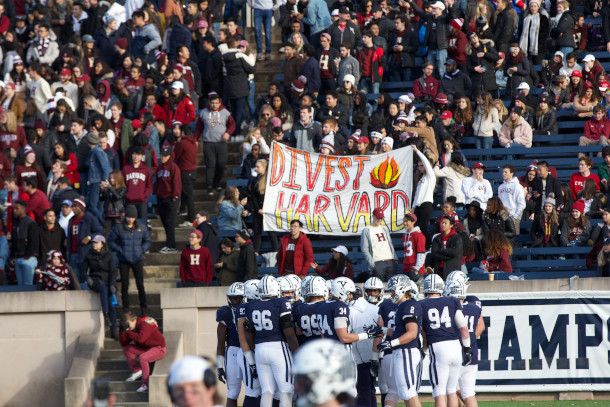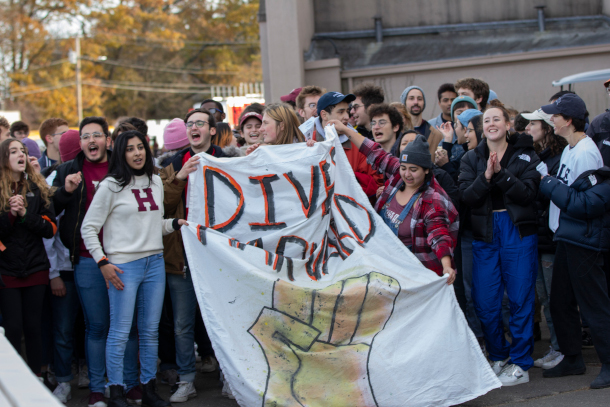Harvard Finally Divests
Air Date: Week of September 17, 2021
Student and alumni protesters stormed the field at the 2019 Harvard/Yale football game to call attention to the fossil fuel divestment movement. (Photo: Paul Johansen, Fossil Fuel Divest Harvard)
Harvard University announced that it will no longer invest in fossil fuel companies, following years of refusal in the face of a prominent and vocal divestment campaign. Harvard is the richest University in the world with an endowment totaling nearly 41 billion dollars. And it is now among the largest organizations to divest from fossil fuels, joining thousands of pension funds, faith groups, and other institutions. Host Steve Curwood spoke to Isha Sangani, a student organizer, and Caleb Schwartz, an alumni coordinator of the campaign.
Transcript
CURWOOD: It’s Living on Earth, I’m Steve Curwood.
Harvard University recently announced that it will no longer invest in fossil fuel companies. That announcement comes after years of refusal to divest its 40 billion dollar endowment of coal, gas and oil despite a hard push from students, faculty, and alumni to do so. The campaign for Harvard divestment made national news in 2019 when protesters stormed the field during the highly anticipated Harvard-Yale football game.
[SFX PROTEST SOUNDS]
CURWOOD: We recently spoke to two organizers involved in Harvard’s divestment campaign.
SANGANI: My name is Isha Sangani. And I am a student organizer with Fossil Fuel Divest Harvard.
SCHWARTZ: My name is Caleb Schwartz. I'm an alumni of Harvard College, and I'm the coordinator of the Fossil Fuel Divest Harvard Alumni Campaign, class of 2020.
CURWOOD: Isha and Caleb shared what this news means for them.
SANGANI: Yeah, I think for me, it's just very vindicating. We've fought for this for so long. So fossil fuel divest, Harvard has campaigned for 10 years to get Harvard to divest from fossil fuels and arguably, the divestment movement has started long before that. And so to have this happen now is simultaneously, it feels amazing. It feels like a really big victory that we got here and at the same time, it makes me really angry that Harvard took so long to begin with. It took making, you know, a legal complaint to the Massachusetts Attorney General, it took storming a football field during the 2019, Harvard-Yale game, it took countless protests and petitions and the support of faculty and alumni and staff and students in the community. And only then when all of that was on the table did Harvard finally listen to its community.
SCHWARTZ: Harvard missed its chance to be a leader in the fossil fuel divestment movement. They've missed it by several years. You know, back in six years ago, when we were fighting the Dakota Access Pipeline, and went through Standing Rock, Harvard was still investing in the fossil fuel industry. So well, this isn't, you know, necessarily a sign of leadership, it is still massive victory for student activists who moved the world's richest university to do something it said it would never do.

Students at Harvard have been calling for divestment from fossil fuels for over 10 years. (Photo Courtesy of Fossil Fuel Divest Harvard)
CURWOOD: What do you think tipped the balance?
SCHWARTZ: Yeah, so actually, I think the legal avenues that we took as an organization really came into play, especially over the last year or two. So, I think recently, in the past few months, we actually submitted a complaint, like I mentioned, to the Massachusetts Attorney General's office, and specifically, we were saying that Harvard was violating its obligation as a charitable institution, to invest in things that are prudent for its charitable mission by investing in fossil fuels. So, once we filed that complaint, a few months later, this announcement comes out and we realized that some of the language from President Bacow's announcement about, you know, it not being prudent to invest in fossil fuels and about Harvard's fiduciary duty, that directly echoes our legal complaint that we filed earlier. So, we think that the complaint as well as just the mounting pressure in general was what finally caused Harvard to listen to our demand.
CURWOOD: I noticed the official announcement from Harvard didn't use the word divest. Even though that's the word that activists have used for years for this movement and others. Why do you think this is and how do you feel about that?
SCHWARTZ: Yeah, I mean, I really encourage anybody who's interested in the story to go and read President Bacow's letter. What I read in the letter was that Harvard was compelled to do the right thing. They were compelled to do this thing that they said they would never do. They're not coming out and leading, they're not coming out of making the right decision because they want to, they are, you know, they release the read letter on a Thursday evening, which is the best time to release something, if you're looking to not get press coverage over it. They didn't use the word divestment. They didn't mention the thousands of students, alumni and faculty who made this happen, who have been fighting this for years, it was very centered around- oh, you know, we're we're choosing to do this as this, you know, the Harvard Management Company, this small group of people. And they totally misrepresented what the movement was. So, if anything that shows that they're embarrassed that this happened, they're embarrassed that they were forced to do this thing, to do the right thing. And I think that's really telling about, you know, moving forward how we have to fight for climate justice.

Harvard’s endowment totals more than 40 billion dollars. (Photo Courtesy of Fossil Fuel Divest Harvard)
CURWOOD: And from a student perspective, tell us why it's important to hold companies and organizations accountable for the climate emergency?
SANGANI: Yeah, so I mean personally I believe, and I know a lot of members of fossil fuel divest Harvard believe this too, is that fossil fuel companies are the most to blame for this climate crisis. And it's very sad to see the position that we've gotten ourselves to, because not only are fossil fuels entrenched in our politics, and they're you know, we have ties to them and institutions that we participate in, educational institutions receive funding for programming and research from fossil fuels. But also, we have people that depend on the fossil fuel industry for jobs. And our society is fundamentally intertwined with that. You know, they had this information that climate change was happening decades ago and they chose to instead mislead the public and to do these, these public relations campaigns that actually clouded the link between climate change and carbon emissions in the public's mind.
SCHWARTZ: Yeah, I keep coming back to this quote that I read over the summer. The quote is "The world isn't dying. It's being killed and the people who are killing it have names and addresses". It's a bit of a you know, blunt and direct quote, but I think it really speaks to the fact that there are a small number of people who hold immense amounts of power, who are investing in a very destructive fossil fuel industry in a very destructive future. And it's up to, you know, the masses, the rest of us to push the system in the other direction.
CURWOOD: Isha how did you get involved in divestment? What inspired you to get involved in this movement?

Isha Sangani is a student organizer with Fossil Fuel Divest Harvard. (Photo Courtesy of Isha Sangani)
SANGANI: Yeah so I'm from Seattle, and I remember very vividly in early High School, we had a series of very bad wildfires, you know, we're talking the whole sky’s pink, there's ash over everybody's cars and I think this was August of 2017. And then that year was quite bad and then next year, we had variation of the same thing. And then next year, it got even worse. I realized that climate change was here, and it wasn't going away. And it was only going to get worse from there unless we do something about it as a society. And so when I got to Harvard, I kind of wanted to, I wanted to find a place where I could channel that energy and to act on climate change. And I felt like fossil fuel divest Harvard was the right avenue for me to do that. So I met this amazing community of people. Now we share friendships, but it all kind of stemmed from us all believing in the same things, which is that Harvard investing in fossil fuels is not leading us to adjust in sustainable future that we need.
CURWOOD: Caleb, where are you from? And when did you first come to understand that there's a climate emergency, the climate crisis?
SCHWARTZ: Yeah, I'm from right near New York City. And I think I've always been aware that there is a climate crisis. But I remember vividly, in 2012, when Hurricane Sandy hit, standing with my family in our home, and we were watching outside as you know, the strongest winds and the strongest rains that I've ever seen, were coming into our neighborhood, our house was flooding. And the power lines outside our house were on fire, and the fire was slowly approaching our house. And I just remember being paralyzed with fear. I remember never experiencing anything like that. And I was lucky, my house didn't burn down, you know, we lost a bunch of stuff in the basement, but we were fine. But then the second shock that hit me was seeing all the people that were not fine. I had friends who lost their homes, I had, you know, we my school, took a field trip out to Long Island to help people, you know, clean their rubble out of their houses and there were people who were disrupted you know, potentially are still feeling the effects to this day. So I saw the great injustice of this current crisis at a young age and I think it really cemented in me, personally, the need to do something.
Caleb Schwartz, class of 2020 at Harvard College is the coordinator of the Fossil Fuel Divest Harvard Alumni Campaign. (Photo Courtesy of Caleb Schwartz)
CURWOOD: What do you think might be the ripple effect of Harvard's divestment of fossil fuels, other institutions?
SCHWARTZ: Well, going back to 2019, when our campaign did a really high profile action during the Harvard-Yale game, we disrupted the football game. Yale ended up winning that football game, but this time we'd be held to divestment so hoping that they divest pretty soon. There are so many more rich institutions that need to divest. But I think something about the divestment movement is that it is very accessible, you know, chances are that you are connected to a church or a pension fund, or just your bank, you know, if your bank with Chase Bank, that's the leading funder of fossil fuels. There's so much that we can do to reform, you know, institutions that touch us at every single level of our lives. You know, the fact that some of the worst pipelines in the world, if you look at who owns them, if you look at whose money is in them, it's you know, every day people, it's teachers, you know, pension funds, it's its workers pension funds that invest in a lot of these terrible projects, and not everybody knows that, and people are starting to catch on to this, you know, being this way the system works. So, I think in terms of ripple effects of this victory, I hope, I hope it sends the message that it is possible to do this at so many other places than just you know, stodgy old institutions. That it is possible to get, you know, everywhere to do it, because if Harvard can do it, that this really rich and conservative institution can do it, you know, we can move a lot of other institutions too.
CURWOOD: Caleb Schwartz is a Harvard alumni and coordinator of Fossil Fuel Divest Harvard and Isha Shangani is a student organizer with the group. We reached out to Harvard president Larry Bacow for comment, though he did not reply by the time we went to broadcast. The bank JP Morgan Chase sent us a statement about sustainability but did not address the issue of their financing of fossil fuel projects. You can see full statements from both President Bacow and Chase on our website, loe.org
JP Morgan Chase Statement:
"JPMorgan Chase is helping facilitate the transition to a low-carbon world by implementing a Paris Agreement-aligned financing strategy, and by aiming to finance and facilitate $1 trillion for green initiatives, such as renewable energy and clean technologies - part of a $2.5 trillion target to advance climate action and sustainable development. We are working with clients to help them navigate the long-term economic and environmental benefits of transitioning to a low-carbon world and setting carbon intensity reduction targets. We are also carbon neutral in our business operations.”
Links
President Bacow’s 9/9/2021 Letter about fossil fuel investments to Harvard University
Living on Earth wants to hear from you!
Living on Earth
62 Calef Highway, Suite 212
Lee, NH 03861
Telephone: 617-287-4121
E-mail: comments@loe.org
Newsletter [Click here]
Donate to Living on Earth!
Living on Earth is an independent media program and relies entirely on contributions from listeners and institutions supporting public service. Please donate now to preserve an independent environmental voice.
NewsletterLiving on Earth offers a weekly delivery of the show's rundown to your mailbox. Sign up for our newsletter today!
 Sailors For The Sea: Be the change you want to sea.
Sailors For The Sea: Be the change you want to sea.
 The Grantham Foundation for the Protection of the Environment: Committed to protecting and improving the health of the global environment.
The Grantham Foundation for the Protection of the Environment: Committed to protecting and improving the health of the global environment.
 Contribute to Living on Earth and receive, as our gift to you, an archival print of one of Mark Seth Lender's extraordinary wildlife photographs. Follow the link to see Mark's current collection of photographs.
Contribute to Living on Earth and receive, as our gift to you, an archival print of one of Mark Seth Lender's extraordinary wildlife photographs. Follow the link to see Mark's current collection of photographs.
 Buy a signed copy of Mark Seth Lender's book Smeagull the Seagull & support Living on Earth
Buy a signed copy of Mark Seth Lender's book Smeagull the Seagull & support Living on Earth

